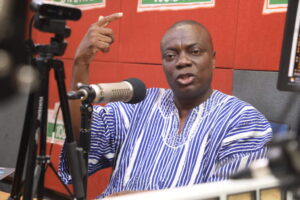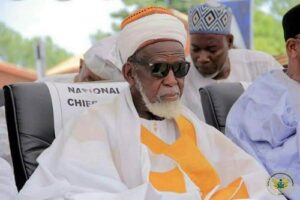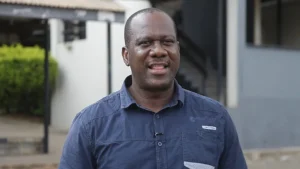
Most Rev. Matthew Kwasi Gyamfi, President of the Ghana Catholic Bishops' Conference
President John Dramani Mahama’s reluctance to declare a state of emergency to deal with illegal mining, popularly known as galamsey, is facing serious public backlash.
Influential groups such as the Ghana Catholic Bishops Conference (GCBC), the National Catholic Laity Council (NCLC) and the Ghana Coalition against Galamsey (GCAG) have criticised the President’s decision, describing the delay to declare a state of emergency as a betrayal of the fight against an existential threat to the country.
A statement signed by the President of the GCBC and Catholic Bishop of Sunyani, Most Rev. Matthew Kwasi Gyaamfi, and issued last Monday evening called on the President to immediately declare a state of emergency to activate extraordinary measures that would decisively deal with the menace.
“Such a declaration would empower extraordinary interventions: curfews in volatile areas, the securing of devastated lands, the dismantling of entrenched criminal syndicates, and the halting of corrupt administrative complicities. The scale of the crisis justifies nothing less,” the statement stated.
The GCBC said it was baffled by the President’s reluctance to declare a state of emergency when all signs showed that galamsey was not only an ecological problem, but also a “cancer in our national soul” which had become one of the greatest threats to national security and the country’s survival.
It added that the state’s indifference to the looming danger could only be because of a non-appreciation or grasp of the magnitude of the galamsey menace.
“Galamsey has matured into a threat to national security. It enriches criminal cartels, breeds lawlessness, and foments violent conflicts in mining communities,” the GCBC added.
Commitment
The government has insisted that it is fully committed to the fight against illegal mining, adding that President Mahama had not ruled out declaring a state of emergency to deal with galamsey.
Presidential Spokesperson and Minister of State for Government Communications, Felix Kwakye Ofosu, in a media interview, said the President merely highlighted the importance of exhausting other approaches before going on the route of a state of emergency.
“Let me indicate that on the matter of state of emergency, the President said that there are conventional approaches that are currently being deployed that he believes would help us achieve the objective of wiping out this canker once and for all. When it becomes necessary, a state of emergency may be deployed,” he said.
During his maiden Meet-the-Press session on Wednesday, September 10, 2025, President Mahama justified his reluctance at the moment to declare a state of emergency on illegal mining, asserting that existing tools provided enough powers to combat the issue.
“I have been reluctant to implement a state of emergency because we have not exhausted all the powers we have,” the President said.
Other measures
However, the GCBC stressed the need for the government to implement other measures in addition to the declaration of the state of emergency to comprehensively deal with the galamsey crisis, insisting that a declaration alone would be insufficient.
Some of the additional measures, it said, should include rigorous enforcement of mining laws, prosecution of offenders, especially politically exposed persons funding galamsey activities, and the creation of alternative livelihood programmes to encourage people to desist from engaging in illegal mining.
“We appeal to President Mahama to show the courage of leadership. His government must prosecute not only the poor, but also the powerful; not only the weak, but also the well-connected. Without courage, no policy will stand, no law will hold, no declaration will succeed,” the statement said.
Disappointment
For the NCLC, an association of Catholic laymen and laywomen, galamsey was not only an environmental and political problem, but also a moral and spiritual crisis that showed mankind’s disdain for God’s creation.
The group expressed full support for the GCBC’s position and appealed to people not to be blinded by greed and end up destroying the environment to the detriment of future generations.
The GCAG has also expressed disappointment at President Mahama’s stance not to declare a state of emergency, saying it would enable galamsey to thrive.
One of the conveners of the GCAG, Dr Ken Ashigbey, in an interview with the Daily Graphic, said galamsey should no longer be treated with kid gloves, as it had moved beyond an environmental issue to the very survival of the country.
He justified the need to declare a state of emergency, explaining that such a move should not be the last resort, as stated by the President.
“Declaration of state of emergency did not mean soldiers will be shooting people. We can declare a state of emergency and make some of the water bodies a no-go area to improve their turbidity,” he said.
Emergency powers
It is not clear what actions the President could take if he declared a national emergency on galamsey, but Article 31 of the 1992 Constitution allows the President, acting on the advice of the Council of State, to declare a state of emergency in any part of the country.
The President could, therefore, declare a state of emergency in the galamsey-prone areas and take far-reaching actions, which could directly or indirectly affect the human rights of persons, but are necessary in dealing with such a national disaster.
Article 31 of the Constitution requires the President to immediately notify Parliament and seek Parliamentary approval for the state of emergency, with Parliament required to either approve the state of emergency or revoke it within 72 hours after being notified






